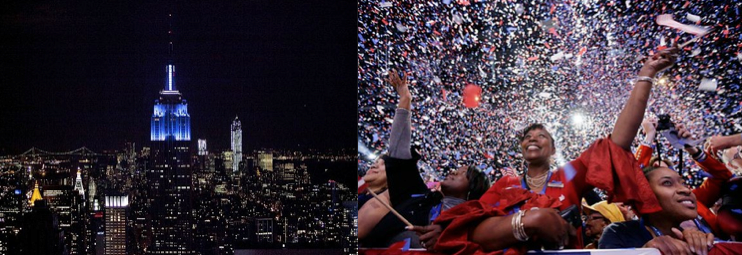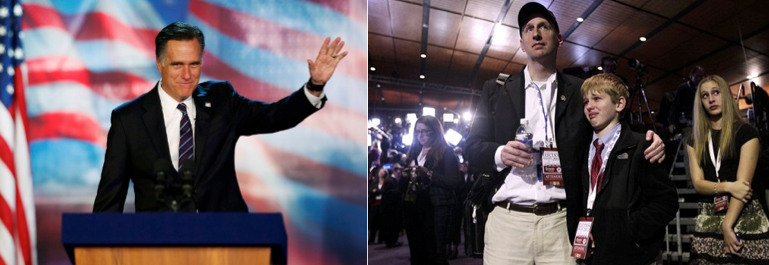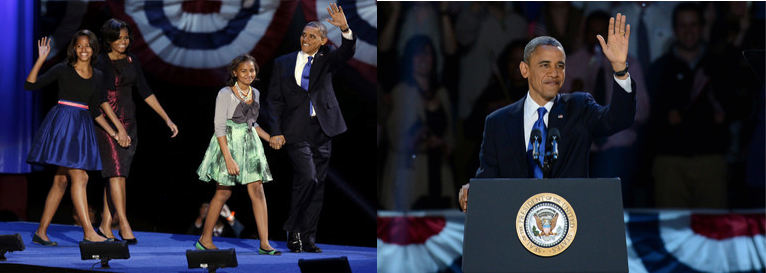A Lost Election
A Lost Election
On November 6, when CNN projected Barrack Obama’s assured reelection at 23:20 (EST), the shifting lights of red and blue from the Empire State Building in New York changed to all blue to mark Obama’s victory; overwhelming joy and excitement at Obama’s campaign headquarters turned McCormick Place in Chicago a huge stage for celebration; a dead silence fell in Boston’s Faneuil Hall, where supporters for Mitt Romney were struck by sadness and disappointment.
 Empire State Building in all blue Supporters for Obama went wild
Empire State Building in all blue Supporters for Obama went wild
Obama once again defeated a Republican candidate and won his seat in the White House for another four years.
At 0:56 of November 7, Romney, after phoning Obama to congratulate him on his victory, turned to his own supporters waiting in the chilly night, and made a “genuine and graceful” concession speech. He called for the ending of “partisan bickering and political posturing” and the combined effort for “a resurgent economy and to a renewed greatness.”
 Romney’s concession speech Romney’s supporters disappointed
Romney’s concession speech Romney’s supporters disappointed
At 01:39, Obama finally came out to greet the expectant crowd with his wife and two daughters. He delivered a 21-minute long victory speech, and just like how he was four year ago, full of confidence and courage, passion and eloquence, setting the audience’s heart afire and blood boiling.
 Obama with his family on the stage Obama delivers victory speech
Obama with his family on the stage Obama delivers victory speech
As if troubled by an uneasy conscience, Obama mentioned the less glorious aspects of the campaign: “I know that political campaigns can sometimes seem small, even silly. And that provides plenty of fodder for the cynics that tell us that politics is nothing more than a contest of egos or the domain of special interests.” He seemed to be repeating what he said on the Democratic National Convention two months ago: “I know campaigns can seem small, even silly sometimes. Trivial things become big distractions. Serious issues become sound bites.” Obama then was a humbled and reflective candidate trying to admonish himself and seek public support, but now he is defending and justifying himself as a winner and America’s savior. Once on shore, we pray no more. The glory of triumph soon dispels the cloud of doubt, and the speech assumes a different undertone. It continues in Obama’s usual style: touching stories told with unspecified characters, parallel slogans shouted out in passionate tone, transitional mood introducing replaced concepts, enveloping all the audience in its grand aspirations. The victory convention grew naturally into a hysterical carnival.
It is hard to fathom the thoughts of supporters for Romney who were watching the live TV broadcast on Boston Streets, but the crying of Abby from Colorado came into my mind. The four-year-old girl’s outcry against the bombarding campaign advertisements made over 15 million hits on Youtube because it voiced many Americans’ distress: we don’t care a damn about who will be the president—just end the bloody campaign because we’re all sick of it.
Tired of election, 4-year-old Abby cries
America’s presidential election that happens every four years is an eye-catching event, generating enthusiasm and expectations all over the world. But this year, the American public has showed a general lack of interest from the very beginning of the campaign. The whole process took over one year, with the same passionate speeches, heated debates, overwhelming advertisements and dazzling conventions, yet it failed to kindle the public’s confidence and hope, without which the campaign would be nothing but a bore and torture, however boisterous and vacillating it appears.
Many causes are accountable for this. In my opinion, the major faults lie in the two candidates’ evading key issues for debate and indulging in empty talks on policy definitions.
I have the fortune to experience the presidential campaign during my visiting term in the States, and have been following the two parties’ moves closely since a year and half ago. Apart from the functioning process and mechanism of America’ democratic politics, three topics captured my interest in particular. The first is about America’s domestic economic policies, and whether innovation economy would be on the candidates’ agenda with renewed attention and measures. The second concerns the global challenges facing humanity, such as climate change, energy consumption and anti-terrorism. To what extent will they enter the political perspective? And what responsibilities await America, the only superpower in an age of globalization and informationalization? The third is regarding US-China relationship. How to bring the economic imbalance and trade friction to a satisfactory settlement? In which areas can the two countries seek fruitful cooperation? To my disappointment, the two candidates touched upon the first two issues without systematic explanation and debating.
As for the third issue, although China featured in both candidates’ proposals and provoked much discussion, on the whole it remained a sub-issue on the economic agenda. In the eyes of many experts, the cliché-ridden “China policy” and “China-bashing” have become monotonous, shallow and ineffective.
The big game is over, but many spectators have lingered. Discussions about the gain and loss of the campaign as well as the country’s future directions are just beginning: Why Romney lost? Why Obama won? What will the next four years bring? Direct and conspicuous titles as such filled the comment section of mainstream newspapers. Both parties believed that the first debate kindled hope for Romney, but the turning point came with Hurricane Sandy hitting the eastern coast on October 29. The hurricane not only sent Obama back to the White House and demonstrated his presidential capacity for decision-making and leadership, but also exposed Romney’s image as CEO of a private enterprise, who could think of nothing for storm relief except collecting donations for the victims. As commander-in-chief of the federal response to Sandy, Obama earned the unabashed praise from New Jersey governor Chris Christine and unreserved support from New York mayor Michael Bloomberg. “October surprise” tilted the precarious balance in Obama’s favor. I think Sandy’s bigger though unexpected contribution is to elevate the campaign agenda to a higher level, forcing the issues of “government function” and “global climate change” into public focus. Undoubtedly Obama had the upper hand. Although there was no time for another debate, nobody questions the attitude and stance of Obama and the Democratic Party.
 Obama at “Sandy” relief sites with Christine and Bloomberg
Obama at “Sandy” relief sites with Christine and Bloomberg
Another important reason for Obama’s victory is the Democratic Party’s successful use of various campaigning strategies. The Democratic Party started a concentrated attack on Romney early on during the Republican primaries, and later successfully portrayed him as a billionaire who cannot relate to the poor; Bill Clinton delivered an emotional speech at the Democratic National Convention and actively participated in the subsequent politicking events; Obama and the First Lady cast their votes early to encourage voter turnout and Obama broke into tears while thanking his campaign staff; Democratic grassroots organizations employed every possible canvassing means, including creating individual file for every potential supporter and paying home visits, knocking on the door and transporting voters to the polling station on the voting day, so as to get out the vote and maximize turnout. After the election campaign, The Washington Post claimed: “A younger America, more diverse in terms of race, ethnicity, national origin, religion, gender, and sexual orientation than ever before, flexed its electoral muscle.” It is proved that the Democratic Party has better captured the dynamic of this age and won the heart of the young Americans.
 The winners not on the ballot?
The winners not on the ballot?
Obama closed America’s 45th presidential election as the first reelected president since 1940 with fewer votes than before, and the first president to succeed with unemployment rate higher than 7.2%. He is confronted with difficult domestic and foreign policy issues facing whoever wins the election, in a more divided and polarized partisan political environment. Perhaps he has not been fully aware of another challenge: the historical burden left by the “small” and “silly” campaigning. When Forbes released an article on November 6 describing the Romney campaign as “the most illogical, insulting, fact-free campaign ever,” should not Obama search his own heart and reflect on his own hard-won campaign? Although Britain’s The Economist endorsed Obama before the election, it declared that “America could do better than Barack Obama . . . this newspaper would stick with the devil it knows, and re-elect him.” Should not Obama feel shamed at such a tongue-in-cheek compliment?
This election has embodied almost all the mediocrities and vices of previous presidential campaigns in history. There were no great issues to engage and enlighten the whole nation, but only broken and contentious policy propositions to divide the public; less of the vision, aspiration and charisma as befitting the leader of a great country, but more of deceit, threat and even personal attacks to attract votes; astray from the Founding Fathers’ advocacy for political civility, and lapsing further into a gridlock of racial disintegration; narrow and self-centered policies replaced liberal and compassionate principles. It is in this regard that I believe Romney suffered no injustice in failure and Obama won an ugly victory. This is purely a lost election. By that I do not suggest America’s irrevocable decline, or the demise of American democracy. Like most Americans, I would rather retain the memory in 2008 while looking forward to 2016.
References:
王缉思, 程春华. “美国兴衰再评估:西风瘦马,还是北天雄鹰.” 中国改革论坛. N.p., 12 Oct. 2011. Web. 5 Aug. 2012. <http://www.chinareform.org.cn/open/governance/201110/t20111014_124417_4.htm>.
Hanrold, Sirkin L., Michael Zinser, and Douglas Hohner. Made in America, Again: Why Manufacturing Will Return to the US. Rep. The Boston Consulting Group, Aug. 2011. Web. May 2012. <http://www.bcg.com/documents/file84471.pdf>.
Lieberthal, Kenneth, and Jisi Wang. Addressing US-China Strategic Distrust. Publication no. 4. John L. Thornton China Center Monograph Series, Mar. 2012. Web. Oct. 2012.
Overholt, William H. The Rise of China: How Economic Reform Is Creating a New Superpower. New York: W.W. Norton, 1993. Print.
Rowen, Henry S. “China: Big Changes Coming Soon.” Policy Review 170 (2011): 35-43. EBSCOhost. Web. 4 Nov. 2012. <http://web.ebscohost.com.ezp-prod1.hul.harvard.edu/ehost/pdfviewer/pdfviewer?sid=f3359b9f-3c2c-4c85-99dc-36e6b39e3018%40sessionmgr13&vid=4&hid=7>.
A Chinese version of the article can be found at Sina Financial and Economics Blog.


maillot de foot pas cher
November 28, 2012 @ 5:29 am
Very good.Thank you very much
InnovChina
December 7, 2012 @ 6:12 pm
这篇文章通篇写的是美国选战双方的狭促和短视,缺乏总体观,从中不可避免的得出目前美国是看不到任何积极因素的结论。但是,在结尾突然笔锋一转,By that I do not suggest America’s irrevocable decline, or the demise of American democracy. 然后列出美国和中国的唱多美国派的文章,与文章的整体基调截然相反,给人以硬挺的感觉。因此,总体文章逻辑缜密,但在结尾却流露了痕迹。